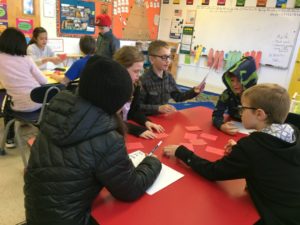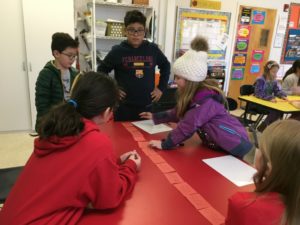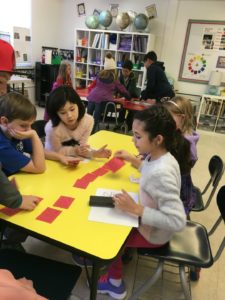by Macky & Veronica | Feb 1, 2019 | Preschool
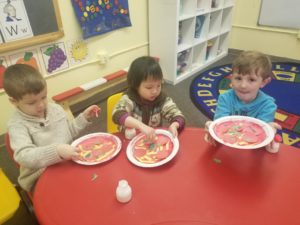 This week we finished the unit “Classic Tales”/ “Cuentos Cásicos”. This was an amazing month! Kids loved and enjoyed the classic fairy tales that we read! There are morals to learn from in each of the classic tales. This week the kids learned about “La Gallinita Roja”. This basic story outline is a tale of the little red hen who finds that none of her lazy friends are willing to help her plant, harvest, or grind wheat into a flour. Yet they all are eager to eat the bread she makes from it. Therefore, at the time she asked their friends “who wants to eat the bread? Everyone wanted!!! Ahahaa, nooo she said” I did everything by myself, so I am going to eat by myself”. The friends (dog, cat and mouse) then learned they should help the red little hen with all their chores from then on.
This week we finished the unit “Classic Tales”/ “Cuentos Cásicos”. This was an amazing month! Kids loved and enjoyed the classic fairy tales that we read! There are morals to learn from in each of the classic tales. This week the kids learned about “La Gallinita Roja”. This basic story outline is a tale of the little red hen who finds that none of her lazy friends are willing to help her plant, harvest, or grind wheat into a flour. Yet they all are eager to eat the bread she makes from it. Therefore, at the time she asked their friends “who wants to eat the bread? Everyone wanted!!! Ahahaa, nooo she said” I did everything by myself, so I am going to eat by myself”. The friends (dog, cat and mouse) then learned they should help the red little hen with all their chores from then on.
The little red hen is a very simple fable that invites children to reflect on the importance of working and striving to achieve things. I invite parents to take advantage of this moral, motivating with collaboration inside the house. The little red hen can serve as a motivation for them to acquire new and small responsibilities (setting the table, bringing the dishes to the kitchen after eating, organizing their toys, carrying the dirty clothes to the basket, to name a few) that will help your children who are becoming more autonomous every day. And autonomy is one of the keys to healthy self-steem.
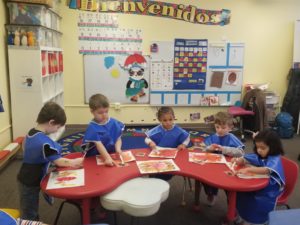 Vocabulary learned this week:
Vocabulary learned this week:
Gallina – hen,
Gato – cat,
Perro – dog,
Raton – mouse.
We did some fun activities: paper red little hen, sequencing (first next, and last), painting in white paper the colors of the red little hen story (combination of colors…red, yellow and brown), and kids made their own pizza. The kiddoss enjoyed their projects!
Letra
This week we learned all about the letter Dd/ letra Dd. Be sure to point out the letter that we practice when you are reading. The Spanish and English pronunciations for the letter D are virtually the same. (Sometimes you will hear more of a /th/ sound in the Spanish pronunciation.)
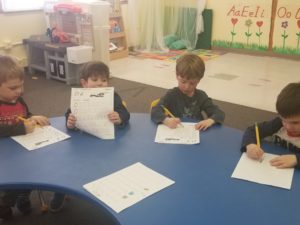
Pre-K letter practice!
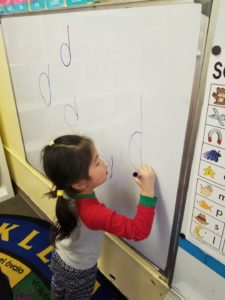
Preschool letter practice!
dedo – finger,
dinosaurio – dinosaur,
delfin – Dolphin,
delantal – apron,
diez – ten,
dientes – tooth.
We incorporated our touch investigation with the letter, Dd/ letra Dd.
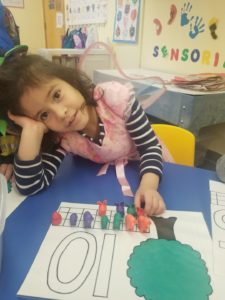 Número
Número
This week we worked with the number 10 (número diez) doing different activities: counting 1-10 using stickers, counting some manipulatives, 10 ducks, horses, bears and blocks. As well, they worked tracing the number 10/número diez.
La Figura y el Color
This week we continued learning the oval shape (óvalo). And also, we reviewed all the shapes that kids are learning: circle/circulo, square/cuadrado, triangle/triángulo, rectangle/rectangulo, and oval/óvalo. Also, kids were coloring sheets of paper using different colors, reviewing our color range: rojo/red, azul/blue, verde/green, yellow, amarillo and and café/brown.
Have a great weekend 
by Ivary & Paola | Jan 25, 2019 | In The Loop
La Lectura
 This week in Literacy, we continued working on our objectives from last week. Students did a great job editing, revising and writing their final book review piece. We are very excited to share these published pieces with you all on our Spanish bulletin next week. Be on the lookout!
This week in Literacy, we continued working on our objectives from last week. Students did a great job editing, revising and writing their final book review piece. We are very excited to share these published pieces with you all on our Spanish bulletin next week. Be on the lookout!
We also had a chance to finish reading El relato de un naufrago, by Colombian writer Gabriel Garcia Marquez. It was very moving to have had the opportunity to share with my students the work of one of the most accomplished and renowned writers in contemporary Spanish literature. They learned about him, the influence of his work not only in Latin-America but all around the world, and maybe got inspired to read some other classic pieces of Spanish literature.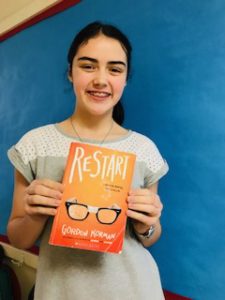
Ciencias
This week we continued to discuss the concept of adaptations. We started to view a video about population changes on the island of Hawaii. Students are identifying and reporting on the adaptations that affect the survival of organisms in this sensitive ecosystem.
Mathematics
This week we continued learning about Algebraic Expressions.
- We learned how to use the distributive property to expand algebraic expressions.
- Then, we learned different techniques to simplify algebraic expressions.
- Finally, we learned how to factor an algebraic expression.
(Written by: Juliette Murrow )
History & Geography
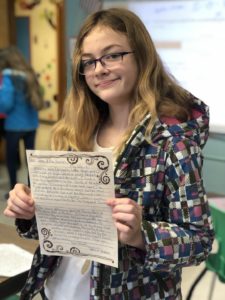 This week we continued learning about the French Revolution.
This week we continued learning about the French Revolution.
- We learned about what it is like to live in Versailles and how it was built.
- We wrote letters from a noble who lives in Versailles and about their daily life.
- We learned why people disliked Queen Marie Antoinette.
(Written by: Lily Hubbard)
English Writing & Spelling
This week we continued learning about Argumentative Writing. Our greek/latin roots this week were mob/mot, tract, and tend/tens/tent.
- We did a greek and latin roots packet with our greek and latin roots and learned that our roots all have something to do with movement.
- We learned about body paragraphs and the power of 3 and strengthening our argument.
- On tuesday we learned about writing an introduction and how it is the claim.
(Written by: Christian Alexander )
by Sarah Segall | Jan 25, 2019 | In The Loop
History & Geography
Our weekly objectives were to:
- Identify Ibn Batutta and describe his travels and his book Rihlah.
- Appreciate the value of Ibn Batuttaś eyewitness account of the medieval Muslim world.
- Recognize Shihuangdi´s sweeping political accomplishments as well as his tyrannical methods of leadership.
- Understand that Shihuangdi became obsessed with immortality and secrecy.
We ended this unit with our unit assessment in which all the kiddos did very well. We will have an end of unit celebration on Monday with African foods, music, dance, games and activities.
We are starting our new unit: Dynasties of China. As always if you have traveled here or have information you´d like to share with the class, we welcome you to do so!
Mathematics w/Laura
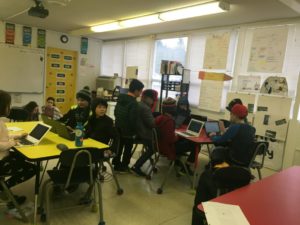
Decimals
- Review
- Put on Your Thinking Caps
- Chapter 7 Assessment on Thursday, January 24th
- Adding and Subtracting Decimals
Puzzles available for extra credit and Friday (Math) Bingo
Remember: MATH …. It’s everywhere
La lectura
This week we practiced our oral presentations and the students did peer critiques, stating something they liked and something that could be improved. Thank you to all the parents who assisted in creating the costumes and for attending the biography presentations.
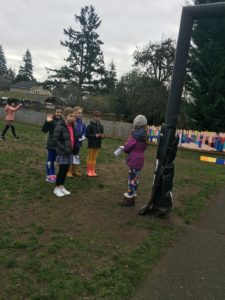
Practice! Practice! Practice!
We were tardy, due to the biographies, but we also read about New Year’s celebrations from around the world. We reviewed and then practiced all the reading strategies we have been working on.
A new spelling list went out on Thursday, to be tested on Friday, February 1st. Yes, FEBRUARY already!

Marco Polo
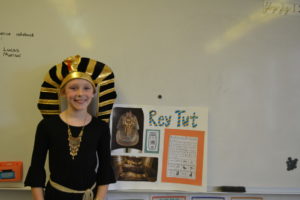
Rey Tut
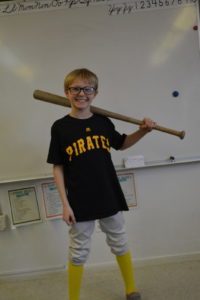
Roberto Clemente
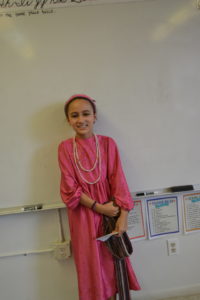
Helen Keller
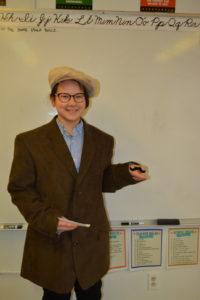
The Wright Brothers
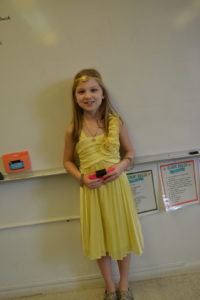
Cleopatra
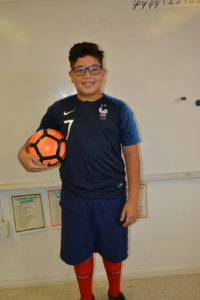
Antoine Griezmann
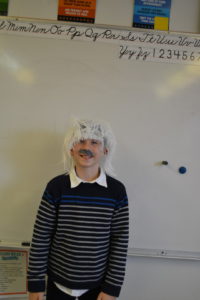
Albert Einstein

Cleopatra
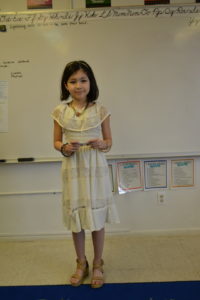
Cleopatra
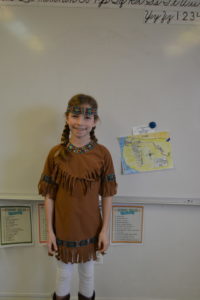
Sacagawea
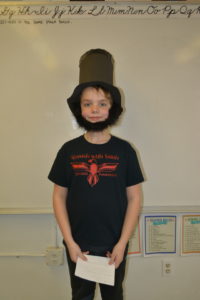
Abraham Lincoln
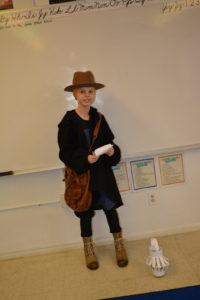
Harriet Tubman
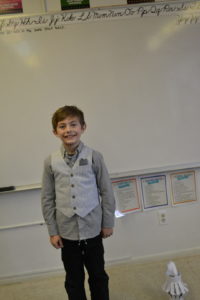
Albert Einstein

Abigail Adams
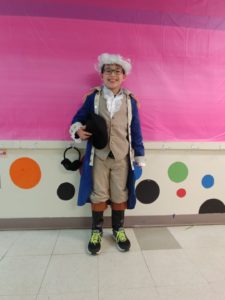
George Washington
Ciencias
Due to the short week and our biography reports, we chose to hold off on Science this week. We will go over the last exam, as a class, on Tuesday and then students will need to write out explanations for their answers (not just change the multiple choice answer). The corrections will then be due on Tuesday, February 5th.
We will start our next investigation on Tuesday: Natural Resourses.
by Jill & Sarah | Jan 25, 2019 | In The Loop
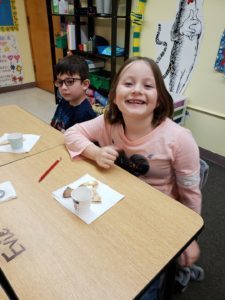
our symposium
History & Geography
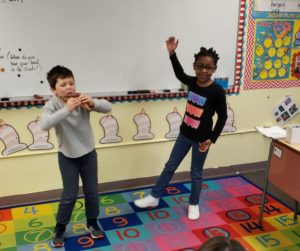
dancing and music at the symposium
Social Studies:
In our studies of Ancient Greece this week we learned took a tour of Athens and learned why they called the period after the Persian Wars the “golden age”. On Thursday we held a symposium, students enjoyed feta cheese, smoked fish, raisins, and Greek pita bread while listening to parts of Homer’s epic poem the Ilia, as well as some local talented musicians and dancers. On Friday the class worked on making tableaux drawings on Greek vases.
Our objectives:
•Understand the golden age as the period when Athenian culture reached its highest point
• identify Pericles as a ruler of Athens during its golden age
• recognize some additional features of Athenian life
• recognize an Athenian symposium
• Identify some arts in which Athens excelled, including pottery, music, and poetry
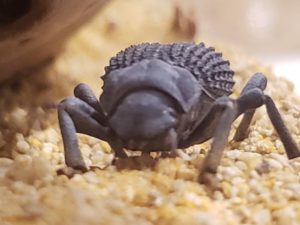 Science
Science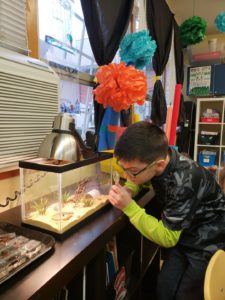
The class is having a so much fun getting to know Blue and Rose, our Blue Death Feigning beetles. This week we studied social insects, such as bees, ants, and wasps. In our insect journals we drew pictures of a bee and a wasp and wrote sentences of what we have learned about each of them.
Our objectives were to:
• explain that most insects live solitary lives but some such as honey bees and paper wasps, or social
• distinguish between social and solitary insects
• describe how all members of a social insect colony come from one queen
• describe the roles of honeybee workers, drones, and queens
• describe how honeybees communicate with one another through “dances”
English Spelling and Writing
On Tuesday we read about Dr. Martin Luther King Jr. and wrote in our journals about what his speech in Washington DC meant to us as individuals. In our journals we also used the idiom of the week, he has his head in the clouds. The class got their new spelling sorts and worked on several ways to sort them. They took a their practice test on Friday. Our Word Wall words were: off, other, our
La lectura
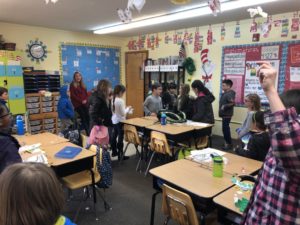
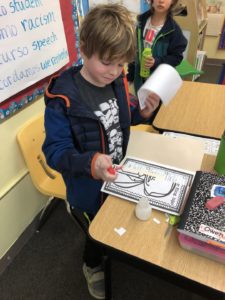 This week we learned about Martin Luther King Jr.
This week we learned about Martin Luther King Jr.
Our weekly objectives were to:
- Place important dates in Martin Luther King Jr.’s life in chronological order
- understand vocabulary from the passage
- Create a lap book about Martin Luther King Jr.
Our PUF words for next week are: negro, abre
Las matemáticas
This week we learned about Volume. Our weekly objectives were to:
- Explore and compare volume
- Use liters to estimate, measure, and compare volume
If you find any liter containers (milk boxes, Gatorade bottles, etc.) please have your kiddo bring them into class to empty use during math!
by Sarah Segall | Jan 25, 2019 | In The Loop
La lectura
This week we read another story about wind. This story was non-fiction and talked about all the different storms that are caused by wind. We also got to see some land formations and the affects of wind on the environment.
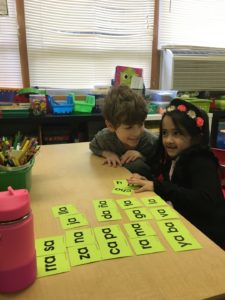
Using syllables with “a” to make words.
Our weekly objectives were to:
- follow along, asking and answering questions, during a read-aloud
- read one-, two-, and three- syllable words (with the letter “a”)
- dictation: correctly write the beginning sound and as much of the word as they can (They did GREAT at this!)
- write in their journals, correctly using space between words, capitals letters at the beginning of a sentence, and punctuation at the end.
- create a windsock (manga de viento) and tell about what it tells us.
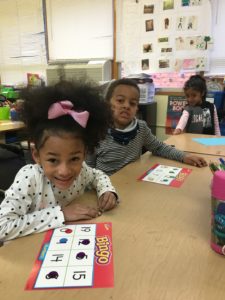
Practicing our number recognition with Friday BINGO.
Las matemáticas
We’ve really been working on number identification and number formation. Be sure to point out numbers everywhere and have your child tell you what they are, in Spanish!
Our weekly objectives were to:
- correctly identify numbers 1-15, out of order
- form all the possible formations of the number 15
- correctly write the numbers 1-15
- read addition equations from left to write, correctly reading the number, + Y, = SON
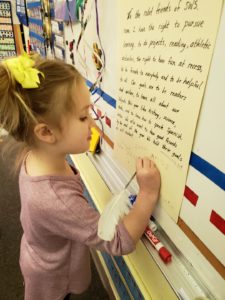
signing our class declaration
History & Geography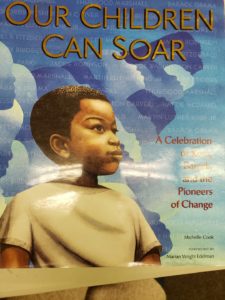
On Tuesday we talked about Martin Luther King Jr. and why we honor him with a holiday. We read a book and discussed people we admire. We learned more about Thomas Jefferson and the Declaration of Independence this week. As a group we came up with our own class declaration and each student signed it with a special pen. We also had lots of giggles drawing the statue of liberty with a Fourth of July firework display in the back ground. On Friday we began learning about Abraham Lincoln.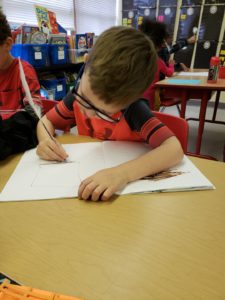
Our objectives this week were to: •recognize Thomas Jefferson as a third president of the United States
•identify Thomas Jefferson as the primary author of the Declaration of Independence
•describe the purpose of the Declaration of Independence as a statement of America’s Liberty
•identify the Statue of Liberty
• recognize Abraham Lincoln as the 16th president of the United States
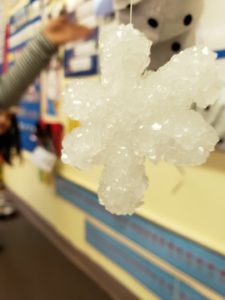 Science
Science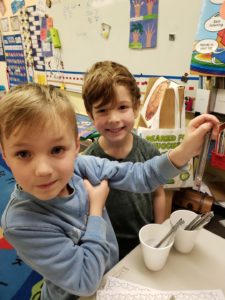
This week we finished our seasonal tree picture and read a fun book to go along with it. On Thursday we made Crystal borax snowflakes and used thermometers to test different temperatures of water in the classroom. We also had a lesson on autumn.
Our objectives were to:
• demonstrate understanding of the following units of time and their relationship to one another: day, week, month, year
• name the four seasons in cyclical order, as experienced in the United States, and correctly name a few characteristics of each season
• characterize autumn as generally the time that the air begins to chill, leaves change colors and fall from the trees, and farmers harvest their crops.
• name the months in this season
• identify ways in which the weather of this season affects our daily routines, such as dress, activities, etc
• name a holiday that occurs in this season

Student of the month
by Macky & Veronica | Jan 25, 2019 | Preschool
This week children continued learning the “Cuentos Clasicos” Unit. We read the classic tale “Pinocchio.” The main idea of this fairy tale is that lying is bad and you do not have to do this.
This is a description of Pinocchio Story:
“Geppetto was a carpenter who made wooden toys for the children of his village. One day, he made a wooden puppet. As soon as he had finished, the puppet came alive and began to dance and sing. Next day he sent Pinocchio to school. On the way Pinocchio found a puppet show. He began dancing with the puppets. The puppet master gave Pinocchio five gold coins and said, “Give these to your father.”
Then Pinocchio met a shy fox. He told him if he planted the coins under a tree, he would get many more in the morning. So, Pinocchio planted the coins and went to sleep under the tree.
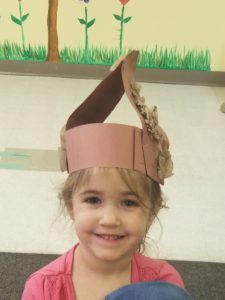 The fox tied Pinocchio to the tree, took the coins and ran away.
The fox tied Pinocchio to the tree, took the coins and ran away.
A kind fairy, dressed in blue, set Pinocchio free. Pinocchio began making up a story to tell the Blue fairy. Then a strange thing happened. Pinocchio’s nose began to grow longer and longer. The more he spoke, the longer it grew.
“Stop!” said Pinocchio.
“It won’t stop. Every time you tell a lie, your nose will grow longer,” said the Blue Fairy. “Please make it stop,” said Pinocchio. “I promise not to lie again.”
The next day, on his way to school, Pinocchio met a boy who said, “Come away with me to Funland.” “In Funland every day is a holiday!” the boy said. “There are toys and games and sweets. And best of all, no lessons to learn!”
So, Pinocchio rushed off with the boy to Fun land. He had lots of fun playing and eating.
Suddenly, Pinocchio and the other boys found their ears growing longer. They were turning into donkeys! The wizard of Fun land had cast a spell on them.
As they wandered around, they came to a circus. The ringmaster made Pinocchio work for the circus. There, Pinocchio hurt his leg while doing tricks. The angry ringmaster threw him into the sea.
In the water, the spell was broken. Pinocchio became a puppet once more. A whale that was swimming by opened its huge mouth and swallowed Pinocchio.
In the Whale’s stomach, Pinocchio saw Geppetto in his boat. “I was looking for you when the whale swallowed me up. I am so glad to have found you!” he said. They hugged each other in delight. “I shall be a good boy from now on,” promised Pinocchio. When the whale was asleep, they crept out of its huge mouth and sailed home. When they reached home, Geppetto fell ill. Pinocchio fed him hot soup and looked after him. “I will go to school and work hard so that I can earn lots of money,” said Pinocchio. “You will never have to work again.”
So, Pinocchio studied hard in the school. Then one day a wonderful thing happened. The Blue Fairy appeared and said, “Pinocchio, you are brave and have a kind heart. You deserve to become a real boy.”
So, she turned him into a little boy. Geppetto and Pinocchio lived together happily.”
Kids learn new vocabulary this week:
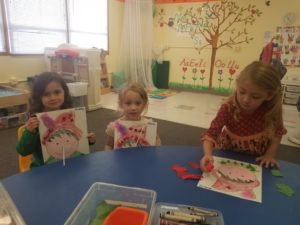
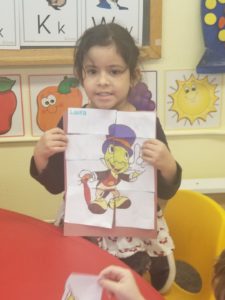 Papá – father,
Papá – father,
Pinocho – Pinocchio,
Grillo – cricket,
Hada – fairy,
Burro – donkey,
Zorro – fox,
Ballena- whale,
Nariz – nose.
As well the children did activities such as making Pinocchio, donkey ears, cricket and fairy puzzles. We had a great time playing with donkey ears, and Pinocchio’s nose  !
!
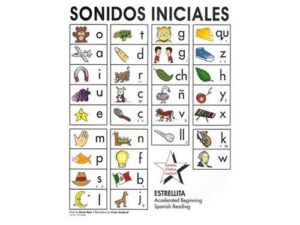 Letras
Letras
This week the children reviewed the letters that they are learning (A,E,I,O,U,M,S,T,P,N,F,L), as well, we gave them a little introduction of our new program to learn the letter sounds “Estrellita.” All the kids are getting very good at saying the word chart. They were very excited!
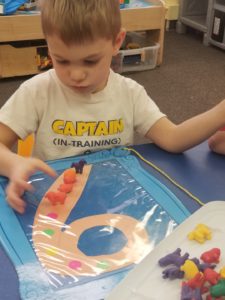 Números
Números
We continued working with the number 9/numero nueve, kids did some different activities, as counting 9 manipulatives, the kiddos used stickers, little animals farm animals as ducks, horses, sheep, pigs, rabbits, and donkeys. Also, they were tracing the number nine.
La Figura y el Color
This week kids continued learning the oval shape (óvalo). We had fun with activities tracing ovals and looking around our classroom for the oval shape. Then, we continued learning and working with brown color /color café. We colored brown donkey ears and searched for different brown manipulatives in the classroom.
Have a great weekend!
by Ivary & Paola | Jan 18, 2019 | In The Loop
La Lectura
The focus of literacy this week has been on a writing project – a book review. We have spent time analyzing the characteristics of a book review and have taken a close look at different samples written by other 6th grade students. Using a rubric, we have established the expectations for an accomplished piece. Every student has selected a book and has started the book review writing process working on their drafts.
• Analyze text, craft, and structure, citing text evidence.
• Use text evidence from close reading to write to a source.
• Pose and respond to specific questions with elaboration and detail by making comments that contribute to the topic, text, or issue under discussion.
• Cite textual evidence to support analysis of what the text says explicitly as well as inferences drawn from the text.
• Determine a theme or central idea of a text and how it is conveyed through particular details; provide a summary of the text distinct from personal opinions or judgments.
• Describe how a particular story’s or drama’s plot unfolds in a series of episodes as well as how the characters respond or change as the plot moves toward a resolution.
• With some guidance and support from peers and adults, develop and strengthen writing as needed by planning, revising, editing, rewriting, or trying a new approach.
Ciencias
This week students were introduced to the concept of adaptation. Tapping on their background knowledge and working in collaborative groups, students constructed arguments to explain this phenomenon, provided several examples and discussed their understanding. The class read an article on the topic and were able to confirm their definitions and expand their understanding, as well as answer comprehension questions. Next week, we will continue to explore more on this topic, watch some videos and take a closer look at different ecosystems to identify adaptations.
by Sarah Segall | Jan 18, 2019 | In The Loop
History & Geography
Our weekly objectives were to:
- Understand the significance of Mansa Musa´s reign in Mali.
- Describe Mansa Musa´s pilgrimmage to Mecca.
- Describe the ascendancy and social structure of the Songhai empire.
- Understand how Sonni Ali Ber and Askia Muhammad came to power and their contributions to Songhai.
- Identify Ibn Batutta and describe his travels and his book Rihlah.
- Appreciate the value of Ibn Battuttaś eyewitness account of the medieval Muslim world.
Mathematics w/Laura
- Comparing Decimals
- Rounding Decimals
- Fractions and Decimals
- Decimal Bingo!
- Next Assessment: Thursday, January 24th
Puzzles available for extra credit and Friday (Math) Bingo
Remember: MATH …. It’s everywhere
La lectura
This week we worked on retelling our story, in our own words, using the past tenses correctly.
Our weekly objectives were to:
- correctly conjugate verbs in the preterite tense
- correctly conjugate verbs in the imperfect tense
- correctly identify the differences of use for the preterite vs. imperfect tenses
- use our verb knowledge to revise our written reports and speeches (for next week)
- use our verb knowledge for this week’s spelling test
Ciencias
This week we practiced using our science notebooks to review and study for an assessment. This process also highlights how important good notetaking is. Each student used sticky notes to mark the three most important aspects of our most recent investigation.
We took our end of the unit assessment. Looking forward to starting our new investigation the week after our biography presentations.
by Jill & Sarah | Jan 18, 2019 | In The Loop
History & Geography
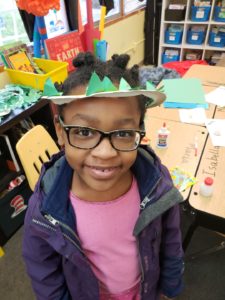 In our studies of Ancient Greece this week we learned about the Olympics and the Persian wars. Everyone had fun making wreaths for our Greek celebration day which will follow the end of this unit.
In our studies of Ancient Greece this week we learned about the Olympics and the Persian wars. Everyone had fun making wreaths for our Greek celebration day which will follow the end of this unit.
Our objectives:
• locate Olympia, Greece on a map
• identify who were allowed to participate in the Olympic Games
• describe the Olympic Games and include events that were held during these games
• understand that the games word event for which all the Greek city-states came together in peace
• compare and contrast the ancient Olympic Games to Olympic Games held today
• understand the Persian Wars as the successful effort of the small Greek forces to repel the huge invading Persian forces
• Identify some important battles of the Wars including Marathon, Thermopylae, and Salamis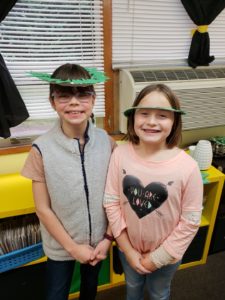
Science
We had some new friends join our classroom this week, crickets and Blue Death Feigning beetles. The class is having a great time observing these creature’s behaviors and activities. We continued to work in our Insect Journals writing about life cycles and personal narratives regarding interactions with insects.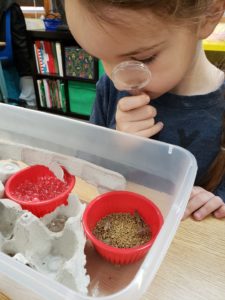
Our objectives were to:
• describe insect life cycles in the process of complete & incomplete metamorphosis • describe how some insects look like miniature versions of adults when they are born from eggs
• explain why some insects molt
• describe how some insects go through four distinct stages of development, including egg, larva, Pupa, and adult
• identify insects who go through a complete metamorphosis and insects that go through an incomplete metamorphosis
English Spelling and Writing
In our journals we used the idiom of the week,” I’m on top of the world”. We also wrote an insect story in our science insect journals this. The class worked on two spelling activities and their spelling sorts. They took a their final spelling test on Friday. Our Word Wall words were: make, more, not, none.
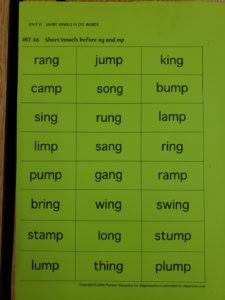
Next two week’s green sort
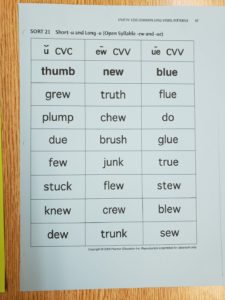
Next two week’s blue sort
by Sarah Segall | Jan 18, 2019 | In The Loop
La lectura
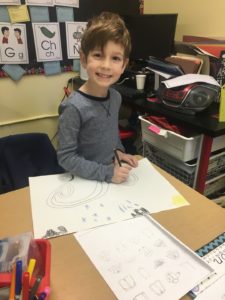
Weather and clothing concept sort.
With our windy weather we were able to really appreciate and immerse ourselves in our language arts unit on wind/ el viento. This week we read Gilberto y el viento. In this story, young Gilberto plays, and sometimes struggles, with “Wind.” Through colorful illustrations we follow Gilberto, his dog, and wind through different seasons and in all sorts of weather.
Our weekly objectives were to:
- correctly identify the initial sound in a given word
- correctly identify the final sound in a given word
- follow multi-step directions to complete a class project
- use our words of the day in sentences: aquí / here, mío / mine
- blend syllables whole-to-part
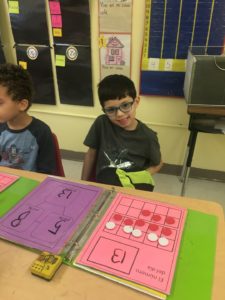
Number bonds!
Las matemáticas
Our weekly objectives were to:
- understand the concept of number bonds: whole-part-part
- deconstruct numbers 13 and 14 to show the many different ways they can be formed
- count to 100 by 1’s
- correctly identify numbers 1-13 when not in order
- form groups of given numbers – representing them with different classroom manipulatives
History & Geography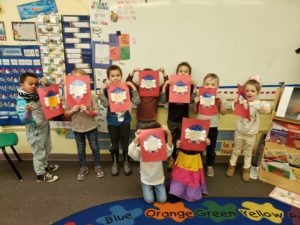
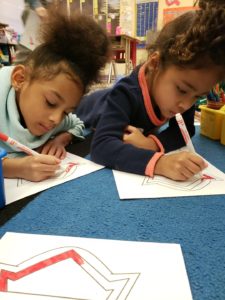 We finished learning about George Washington this week. Through out this section we’ve seen several portraits of our first president so we decided to make one ourselves. Continuing on with this unit we began learning about Thomas Jefferson and the contributions that he made to this country.
We finished learning about George Washington this week. Through out this section we’ve seen several portraits of our first president so we decided to make one ourselves. Continuing on with this unit we began learning about Thomas Jefferson and the contributions that he made to this country.
Our objectives this week were to:
• recognize George Washington as the first president United States
• recognize the sacrifices George Washington made for the country
• understand how George Washington’s spectacles humbled his soldiers •recognize Thomas Jefferson as a third president of the United States
•identify Thomas Jefferson as the primary author of the Declaration of Independence
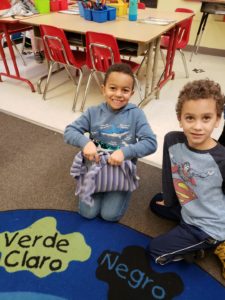 Science
Science
We started our week in science by making ice cream in a bag. The class had so much fun learning how salt affects ice and lowers it’s freezing point. They all agreed that this was an experiment well worth trying! We continued to learn about the seasons. We are working on a art piece to depict the seasonal changes.
Our objectives were to:
• demonstrate understanding of the following units of time and their relationship to one another: day, week, month, year
• name the four seasons in cyclical order, as experienced in the United States, and correctly name a few characteristics of each season
• characterize spring as generally the time that the air warms, the ground thaws, plants begin to grow, and baby animals are born
• name the months in this season
• identify ways in which the weather of this season affects our daily routines, such as dress, activities, etc
• name a holiday that occurs in this season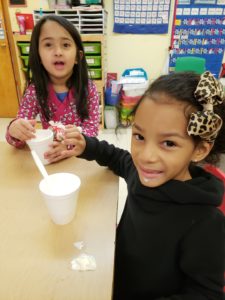
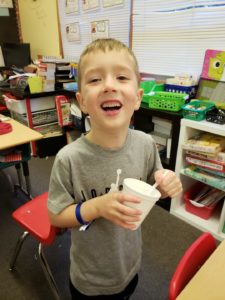
Just a reminder to everyone that our Robot book bags come home on Monday and should return on the following Monday.
 This week we finished the unit “Classic Tales”/ “Cuentos Cásicos”. This was an amazing month! Kids loved and enjoyed the classic fairy tales that we read! There are morals to learn from in each of the classic tales. This week the kids learned about “La Gallinita Roja”. This basic story outline is a tale of the little red hen who finds that none of her lazy friends are willing to help her plant, harvest, or grind wheat into a flour. Yet they all are eager to eat the bread she makes from it. Therefore, at the time she asked their friends “who wants to eat the bread? Everyone wanted!!! Ahahaa, nooo she said” I did everything by myself, so I am going to eat by myself”. The friends (dog, cat and mouse) then learned they should help the red little hen with all their chores from then on.
This week we finished the unit “Classic Tales”/ “Cuentos Cásicos”. This was an amazing month! Kids loved and enjoyed the classic fairy tales that we read! There are morals to learn from in each of the classic tales. This week the kids learned about “La Gallinita Roja”. This basic story outline is a tale of the little red hen who finds that none of her lazy friends are willing to help her plant, harvest, or grind wheat into a flour. Yet they all are eager to eat the bread she makes from it. Therefore, at the time she asked their friends “who wants to eat the bread? Everyone wanted!!! Ahahaa, nooo she said” I did everything by myself, so I am going to eat by myself”. The friends (dog, cat and mouse) then learned they should help the red little hen with all their chores from then on. 












































